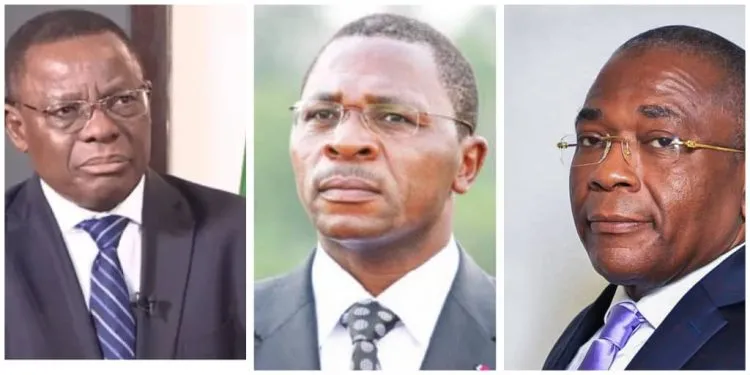By Daniel D.
The Minister of Territorial Administration, Paul Atanga Nji, has banned two political associations run by the foremost opposition leader Maurice Kamto and former SDF parliamentarian Jean Michel Nintcheu.
In a release today, March 12, he instructed the 10 regional governors to crack down on activities carried out under the banner of the Political Alliance for Change and the Alliance for a Political Transition in Cameroon.
Atanga Nji said the two associations are illegal movements and that they are run by certain political leaders who are “in search of notoriety and defiance of the law in force”.
He went on to ban them from holding public meetings, press conferences, and consultations to recruit new members.
The measure may be linked to a recent visit by the Kamto-Nintcheu coalition to the Kondengui Central Prison, where they met with Anglophone separatist leaders.
Among those they visited was Sisiku Ayuk Tabe, President of the Ambazonia separatist movement in the English-speaking Regions of Cameroon, who is serving a life sentence alongside nine others.
Although both Kamto and Nintcheu have made no official communication about their Kondengui meeting, media reports suggested that it was meant to secure the support of separatist leaders to the coalition.
The government sees this as an affront to its attempts to silence the separatist movement and its promoters.
“More seriously, the promoters of these clandestine movements went to meet in prison terrorists definitively convicted of serious crimes planned and orchestrated in the North-West and South-West Regions with the aim of forging a political alliance. They go so far as to impose unacceptable prerequisites on the Government in favor of these dangerous terrorists,” Atanga Nji’s release said.
In an attempt to thwart the political coalition, Atanga Nji stated: “The movements called ‘Political Alliance for Change’ and ‘Alliance for a Political Transition in Cameroon’ are not political parties within the meaning of Law No. 90-56 of December 19, 1990, relating to political parties. Having no legal existence, these clandestine movements cannot carry out any political activity throughout the national territory.”
He added that only legalized political parties have the right to request authorization and obtain receipts for meetings, demonstrations, conferences, or public meetings from the administrative authorities.
Although the Minister’s release did not mention the names of the political leaders behind these “clandestine” movements, it is certain that they include former Presidential candidate Maurice Kamto and the Member of Parliament for Wouri, Jean Michel Nintcheu.
Kamto, who believes he won the presidential election in 2018, has been promoting a movement called the Political Alliance for Change (PAC).
When he contested against President Biya in the 2018 elections, he ran under the banner of the Cameroon Renaissance Movement (CRM), where he is the Chairman.
But his recent outings suggest he might not be representing the CRM at the 2025 polls.
Kamto openly campaigned for membership into PAC in his end-of-year speech on December 31.
He suggested that he would face President Biya’s CPDM party under the PAC.
“It is important to remember that the PAC remains open to all those who believe that the current regime is now Cameroon’s problem and therefore can no longer contribute anything to its recovery. Our compatriots in the ruling CPDM party who demonstrate a patriotic reawakening are also welcome in the PAC,” Kamto said in the speech.
Maurice Kamto’s PAC has reportedly been in a coalition with a newly created association run by dismissed SDF party member Jean Michel Nintcheu.
Nintcheu, a vocal parliamentarian, told Jeune Afrique in a November interview that any opposition coalition against President Biya that excluded Kamto’s CRM party would fail.
He also hinted that his political movement, Front For Change Cameroon, would strike a coalition with Kamto.
The government has now dampened hopes of the coalition by declaring it illegal.
Minister Atanga Nji said Nintcheu’s status of Parliamentarian or politician cannot be a free pass to defy state authority, incite rebellion, make insulting remarks about the authorities, and trample on public order.
But the Minister left Cameroonians in the dark concerning the particular instances where Nintcheu or Kamto allegedly incited rebellion.
Cameroon is in a pre-election year. But the opposition remains as fragmented as ever.
Attempts by Kamto and Nintcheu to get other influential politicians (including Cabral Libii and Joshua Osih) into their coalition have been futile.
It is still uncertain whether President Paul Biya, 91, who has been ruling for 42 years now, will run for next year’s election.
But his party members are resolute that he should be their candidate.



